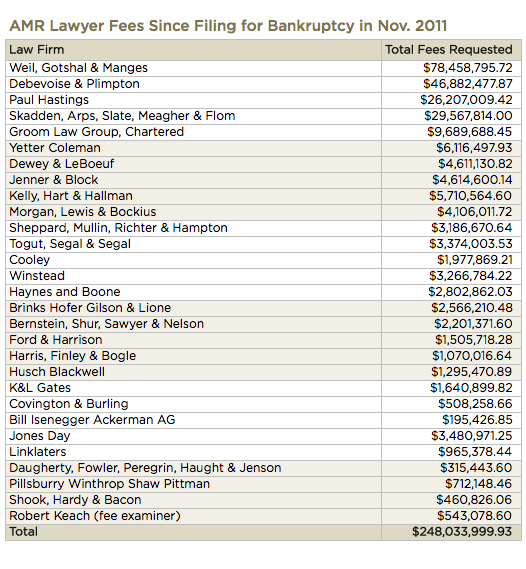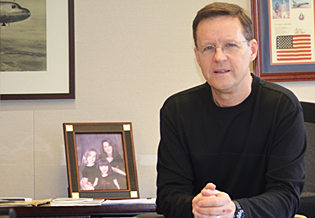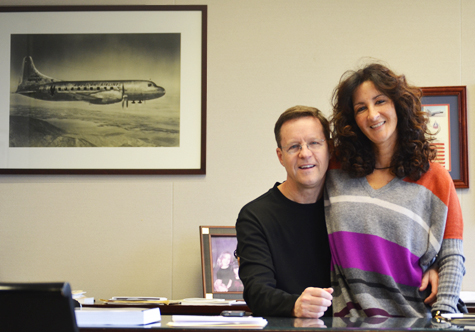© 2013 The Texas Lawbook.
By Mark Curriden, JD
Senior Writer for The Texas Lawbook
FORT WORTH (December 14) – Gary Kennedy should receive a lot of gift baskets from lawyers and law firms this holiday. For the past two years, the American Airlines general counsel spent about $500,000 a day on outside counsel.
Let me repeat that: $500,000 a day.
The total legal tab for the bankruptcy, merger with US Airways and the antitrust litigation battle with the U.S. Department of Justice will likely reach $275 million.
“I know, it’s an outrageous amount,” Kennedy told the General Counsel Forum at a conference last month. “I have difficulty even saying those amounts out loud.”

Kennedy was a 28-year-old rookie lawyer when he joined American Airlines in 1984. He knew nothing about antitrust law, corporate bankruptcies, billion-dollar mergers and acquisitions, labor law or mass torts.
“I was a pup back then and didn’t know much,” he says.
Thirty years later, Kennedy is about to become one of the most sought after lawyers in the U.S. because of his knowledge and experience in all those areas.
In January, he concludes his three decades-long employment with American Airlines, where he has been general counsel for the past 11 years.
By all accounts, Kennedy is one of the most respected chief legal officers in the country. During his tenure at American, he oversaw the company’s potentially crippling 9/11 litigation, played a key role in the acquisition of TWA Airlines, handled contentious labor negotiations and supervised the monumental antitrust battle with South Lake-based Sabre Holdings, a flight data and reservations business. On the side, he built a corporate legal department that is highly acclaimed for its diversity and a mandatory pro bono program that GCs nationally considered the ideal model.
“I don’t think there’s a more respected general counsel in Texas,” says Mike McKool of McKool Smith, who has represented American Airlines on various intellectual property disputes since 1986.
“Gary has such gravitas, but he is not arrogant at all,” says McKool. “He demonstrates respect and politeness for people at all levels.”
Then came Nov. 29, 2011, when Kennedy and his team walked into the federal bankruptcy court at One Bowling Green in Manhattan to file their Chapter 11 petition.
During the past two years, Kennedy masterminded one of the most complex, expensive and, arguably, the most successful corporate bankruptcy in U.S. history. As part of it, he engineered a $17 billion merger with US Airways and battled and then settled a major antitrust lawsuit with the U.S. Department of Justice.
“The past two years have been incredible – non-stop action seven days a week with so many surprises and challenges,” says Kennedy, who packed up his office this past week with his wife, Michele, and their daughter, Isabel.
In every interview, Kennedy gives full credit to his legal team, including American Airlines Associate General Counsel Bruce Wark, who led the antitrust litigation, and Kathryn Koorenny, who took the lead on the bankruptcy.
And Kennedy has nothing but praise for his successor, Stephen Johnson, who was US Airways Executive Vice President for Legal Affairs and now holds the same position at the new American Airlines.
“Steve is extraordinarily smart and I’ve come to respect him a great deal working across from him and with him,” Kennedy says.

In an exclusive interview with The Texas Lawbook, Kennedy provided an inside peak at his career, the past two years and what his future holds.
Kennedy said his biggest regret during the past two years was filing for bankruptcy in the Southern District of New York instead of Fort Worth.
“If I had to do it again, I would file in Fort Worth, which would have given us a home court advantage,” he says. “Plus, it would have been good to have all the New York lawyers and advisers having to come here instead of us going there.”
Kennedy spent much of the past two years commuting to New York and Washington, DC. He attended most of the bankruptcy proceedings and was personally involved in negotiating the settlement in the antitrust case with the Justice Department.
He always flew American Airlines, except once. The weekend prior to AMR filing for bankruptcy in 2011, he flew to New York on Continental Airlines. The reason: he was worried people would recognize him on American and speculate about a possible bankruptcy filing.
Lawyers for the outside law firms were sworn to secrecy. Partners and associates were instructed to avoid discussing anything about their work, including the name of the client they were representing, with their spouses and parents, which was difficult because the lawyers were required to work throughout that Thanksgiving holiday two years ago. The decision to file Chapter 11 was kept secret until it was filed in New York.
The success American achieved in such a complex bankruptcy and subsequent merger was a direct result of Kennedy’s “strategic leadership,” says Glenn West, the managing partner at Weil, Gotshal & Manges in Dallas and one of the lead lawyers who worked on the transaction with US Airways.
“Here’s a guy who was not trained as a bankruptcy lawyer or as an M&A lawyer, but he was in the middle of it everyday,” says West. “You meet people every once in a while who are truly remarkable individuals. Gary is one of them.”

Kennedy says he has loved his 30 years at American.
“Working for a law firm is like dating. When a deal is finished, you move on to the next project,” he says. “Working in house is like a marriage. You get to know every aspect about the business.
“I fell in love with the airline business,” he says. “It’s a very sexy industry. It is cutting edge intellectually and there is something about transporting people around the globe in a metal (or these days a composite) tube at 35,000 feet thousands of times a day, that just gets in your blood.
“It is a relentless, tough business, but at the same time it is enormously gratifying.”
Kennedy worked with four CEOs – Bob Crandall, Donald Carty, Gerard Arpey and Tom Horton.
“Working with smart, talented guys like these and surviving to talk about it is a real plus,” he says. “The intellectual stimulation is better than any drug on the market.”
The role of the chief legal officer has changed dramatically during the past dozen years, according to Kennedy. He points to the impact of Sarbanes Oxley in the wake of the Enron and Worldcom scandals and the increased government regulation that followed.
As a result, he says, the GC role is “much more demanding today” than it was when he took over in 2003.
“There is much greater risk, greater accountability,” he says. “You really have to be on your game every day.”
Kennedy says general counsel today should be “catalysts to advance the mission of the company.
“Don’t just think about the risks and throw up road blocks,” he says. “Find solutions and help propel the business forward.”
The practice of law is different now, too.
“It’s definitely changed, and not in a good way,” he says. “It seems we’ve managed to make things more complex than they need to be and lawyers often seem more concerned about the potential for liability than necessarily doing what makes sense.
“Law firms have to get a handle on fees,” he says. “The rates are simply excessive.”
That being said, he is “not a big fan” of alternative fee arrangements and he praises the law firms he has turned to most often during the past several years.
Kennedy specifically points to Kelly Hart, Yetter Coleman, Haynes and Boone, McKool Smith and Weil as law firms he believes “care deeply about AA and have worked tirelessly on our behalf.”
“Many of these lawyers have made tremendous personal sacrifices to advance American’s interests,” he says. “I really owe them much gratitude. They have become part of the AA family.
“Dee Kelly Jr., Paul Yetter, Jan Sharry and Mike McKool are excellent examples of what I like in efficient law firm operators,” says Kennedy. “They provide great value to their clients.”
Outside counsel hired by Kennedy say he is a quick study, sees the big picture, is excellent at developing legal strategy and never micromanages.
“Gary is not a passive general counsel at all,” says Dee Kelly Jr. “He’s very knowledgeable about all the cases. And he lets you know if you are doing right or wrong very quickly, which is what you want from a client.”
Kelly Jr. and others say Kennedy is a true lawyer who treats outside counsel as an actual partner, not as an hourly employee.
“Gary has great respect for, and confidence in, the civil justice system and he believes the civil justice system will give him the right result in resolving disputes, which is not something all GCs or clients believe,” says Yetter in Houston.

Two of Kennedy’s crowning achievements, according to fellow GCs, are his successes in developing strong diversity and pro bono efforts.
“It’s simple. There are millions of people who simply cannot afford or otherwise obtain access to legal services,” says Kennedy. “We have an ethical obligation to help others. That’s why we instituted a mandatory pro bono program for all of our attorneys. If you want to be an attorney at AA, you have to give back to the community.”
Kennedy is equally adamant about diversity.
“The profession simply has not done enough in this arena,” he says. “And I mean diversity in its broadest sense – racial, disability, sexual orientation, etc. We’ve tried to advance the ball and made some progress but not nearly enough. The profession has a long way to go.
“GCs should pay more attention to the diversity efforts of their outside counsel,” he says. “Only when that happens will law firms get serious.”
Kennedy says this past week was very emotional, as he packed his office and said his goodbyes.
“I’ve made a habit of climbing the stairs every day when I arrive,” he says. “Knowing this was the last time I would trek to the sixth floor was an odd feeling. It was like leaving an old friend for the last time.
“My wife and youngest daughter came to the office. We took a few pictures,” he says. “My daughter has been coming to the office since she was a baby and, like always, she spent time re-arranging my stuff, opening all the drawers and cabinets.
“She even asked if we could take the scissors and stapler home. We decided to leave them for the next GC.”
Executive and legal headhunters say that Kennedy may be the most sought after person on the planet. They say he is desired by corporations, law firms, investment banks and private equity operations.
“Gary can write his own chapter because very few general counsels and executives have seen and done what he’s done with such great success,” says Susan Pye, the CEO of Pye Legal Group.
“Gary is truly a role model for other GCs – right there with Charlie Matthews [of Exxon Mobil] and Wayne Watts [of AT&T],” says Pye. “He has extraordinary respect among GCs and lawyers.”
For the record, Kennedy says he is “pleased” with the exit package American Airlines gave him. He declines to discuss the details, which will be included in the company’s next quarterly financial reports to the U.S. Securities and Exchange Commission.
But what are his specific plans?
“It’s like the sign that says ‘Gone Fishin’. Right now, I plan to spend time with family, drive my daughter to school and, for the first time in many years, take a vacation without being on a conference call every day,” he says. “I am passionate about the outdoors – fly fishing, backpacking, hunting, mountaineering, so the bucket list is pretty extensive. And my wife and I have a long list of places we want to travel.
“I have a strong interest in serving on a corporate board and putting my experience to use in that capacity,” he says. “And, I plan to continue doing pro bono work and some public interest work focused on women and children issues.”
What does his wife, Michele, who is also a lawyer, think about Kennedy being around the house a whole lot more?
“She claims that she is excited, but I know she is the CEO of the household,” he says. “So, unless I plan a hostile takeover, I’ll need to stay out of her way. I like to stay busy and don’t like to sit down so this will be an interesting challenge.”
Adds Susan Pye, “We haven’t heard the last from Gary Kennedy. He’s a true leader among lawyers and that’s all that needs to be said.”
© 2013 The Texas Lawbook. Content of The Texas Lawbook is controlled and protected by specific licensing agreements with our subscribers and under federal copyright laws. Any distribution of this content without the consent of The Texas Lawbook is prohibited.
If you see any inaccuracy in any article in The Texas Lawbook, please contact us. Our goal is content that is 100% true and accurate. Thank you.
